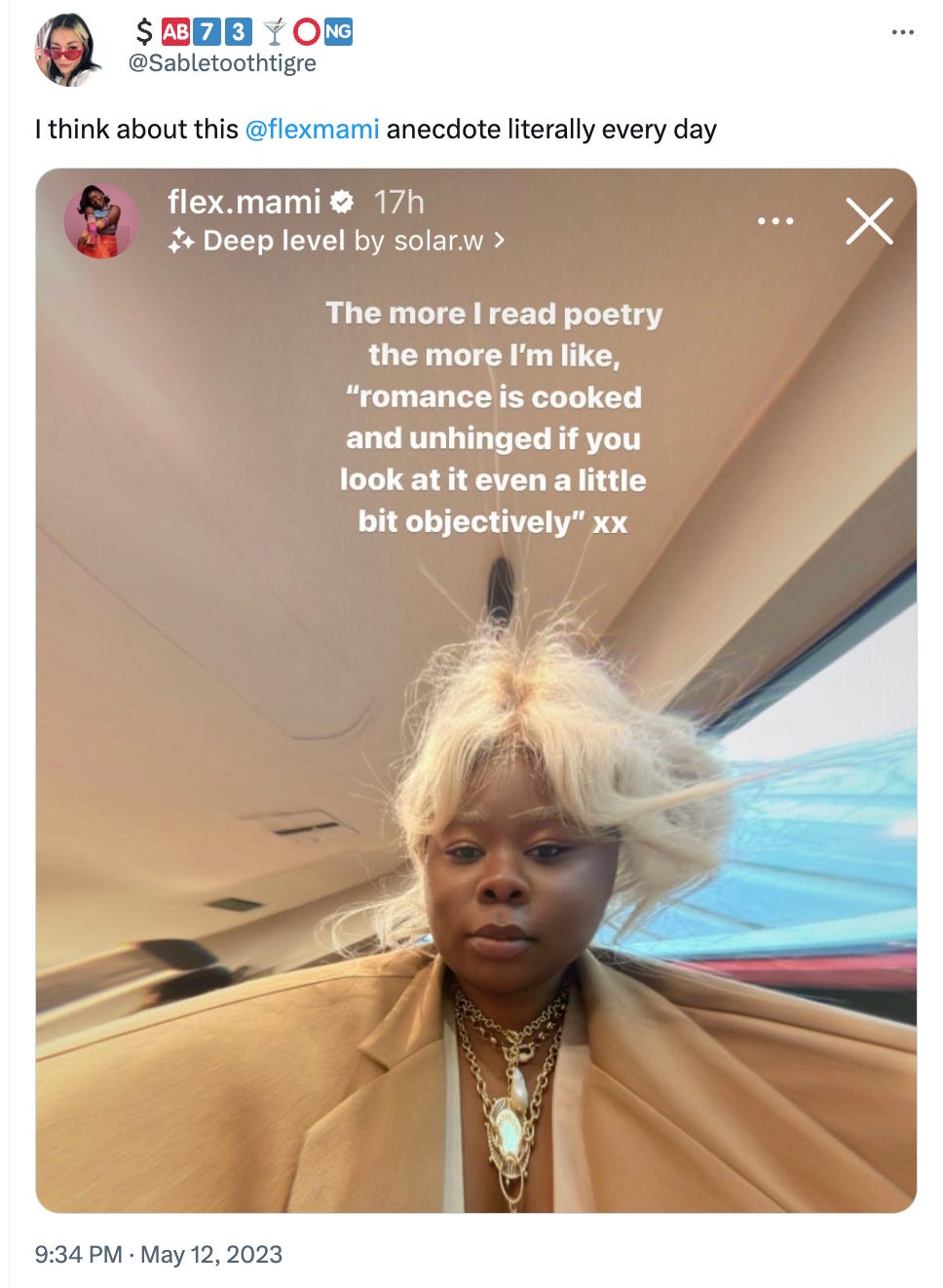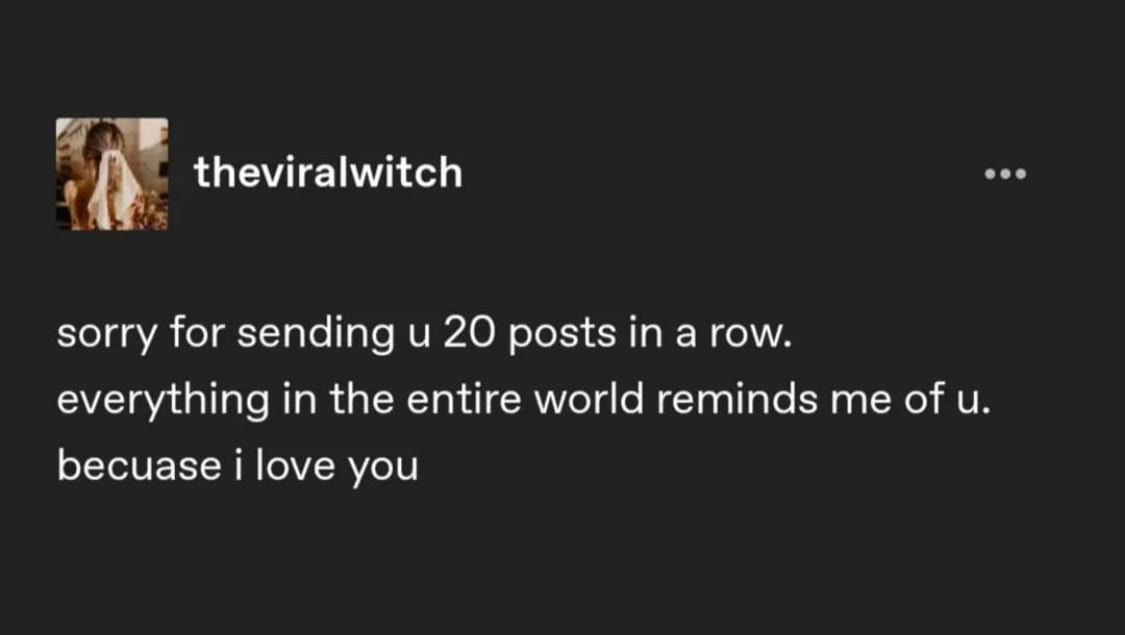At some point, everyone is made aware of the five love languages, often against their will (in my case). Eight years ago some chap named Gary Chapman wrote a book on five ways we express love AKA love languages: physical touch, acts of service, gift giving, words of affirmation, and quality time. I haven’t read it but I don’t think anyone necessarily needs to now, considering how we’ve collectively absorbed these ideas through social osmosis or when someone puts you on the spot by asking what’s your love language and then explains what they are to you if you haven’t heard of them before. It is now just as common of a prerequisite as the What are you looking for and What are we conversations. Love languages suit our lifestyles of simplifying things into easily understandable categories without having to put too much thought energy into it. Also, everyone loves an online quiz. Complex quirks and contradictions harsh the romantic narrative. But alas, if there is one cognition worth the dissonance, it’s Love™.
One of my favorite Internet people, Lillian Ahenkan AKA FlexMami, posted a little quip that despite its 24-hour expiration, has not expired from my thoughts since.
Now, according to ???, there are two NEW love languages: shared experiences and emotional security. (These are also just two things people do in any kind of connected dynamic, and a level of connected functionality in a healthy relational dynamic, respectively.) If you google love languages you’ll find many sources (websites) that tell you different things about what these are. It’s not technically misinformation if you consider that the whole concept is take it or leave it. But Gary’s been real quiet lately.
As a certified LoverGirl™, my instinct is to gristle when any mortal attempts to define love in some universally understood way. It simply isn’t, nor should it be! Additional love languages are only further evidence that language is constantly evolving (which is why I never know what people born ten years after me are saying anymore), as are the ways that we relate to one another. It’s also why I can make sound effects and add -y to words to change their usage and most people are able to understand my intent. The slang adopted into mainstream communications often enriches the ways we communicate even more accurately or in more nuanced ways than the original language can offer. If these official love languages feel too broad, there is plenty of slang to tailor to our personal experiences. We are our own Chat Greenpoint.
Anyway, reporting live from Hater Island, here are the (my) definitive love slanguages:
Nonsense
As my day ones will know, my fundamental philosophy of living involves a generous heap of nonsense for nearly any and every circumstance, situation, and dynamic. You would think this makes me an incredibly irritating person but no one has asked for their money back yet! Adopting silliness into a dynamic can help keep things moving along in mildly inconvenient or irritating circumstances, it passes the time much more enjoyably, and is inherently disarming, leading to stronger connections, IMO. Leading studies show that a lack of nonsense in love dynamics leads to really boring stuff. And really boring stuff leads to taking people for granted. And taking people for granted is not very certified Lovergirl™ of you. Nonsense is what keeps things interesting and endearing — maybe also confusing and alarming, but definitely not boring. You might be thinking, Oh this is just having bits, which personally is never something I can condone or stomach, but go with god I guess.
 Tiktok failed to load.
Tiktok failed to load.Enable 3rd party cookies or use another browser
“Toad voice”
This is related to nonsense in a specific yet ubiquitous way. I don’t mean an actual toad because I’ve never had a chat with a toad. As far as I know, they don’t speak at all, which probably means they’re great at keeping secrets. I mean Toadstool from Mario, the mushroom-hatted little dude who speaks in a gargle-y falsetto, which I adopt for emphasis only when I’m denoting something yelled or shouted but at a conversational volume. (How annoying would it be if that was my voice all the time?)
Many people have their own version of Toad Voice. Maybe it’s just dropping into a silly British accent (if you’re not British) when it suits. I liken it to the voice people use to speak to their pets, but instead with other pet-like people — people you have great affection for, who you feel comfortable around, who are enthusiastically receptive to your most chit-chatty authentic self. But sometimes I whip it out when I really need you to know how I am (lowercase) yelling.
Biting (lightly)
Cute aggression is a real scientific plight for us CLGs because sometimes we are so overcome with affection that our brains go momentarily feral, and we must wrap our teeth lovingly around any mouth-sized bit of flesh belonging to the object of our aggression and lovingly nosh.
Memes
This is a product of our digital culture, which at first I was like, No that’s not a love language, that’s just how people relate to one another now. But it sort of is now! Especially when you consider how someone sending you the right meme (or vice versa) is a way to show you that you’re seen and understood. It’s also a precursor for nonsense, so that’s always helpful.
Alternatively, it is also very telling when someone simply doesn’t understand you at all. All it takes is sending one cringe meme and it’s over.
Playlists
Historically, I do not condone romantic playlists. It feels like horny homework, and who likes homework? One time a former bf made me an 80-track mix CD and insisted I listen to it imminently and give feedback for every track selection and placement. I thought surely he can’t be serious. Reader, he was quite serious. Plus bummed when I didn’t do that because who has the time!!1 But I must recognize this twee-ass gesture as a common practice simply because it is. One of the reasons music makes for such potent romantic currency is that it has a poetic ability to endorse the best sentiments of our truest feelings without the complicated emotions beneath them. Also, you can wiggle to them.
But, like memes, an unsuitable playlist also has the ability to stir the ick where the ick was previously unfounded. So. You’ve been warned2.
Feeding
Any culture with a unique cuisine to its name understands the universal love language of preparing a meal for those you love (a practice that is unfortunately gendered and delegated as some expected matrimonial task, and thus taken for granted when it’s all the time). Most Asians know of the sliced night fruit offerings requisite in even the most economically skint households. My mom knew how to peel grapefruit perfectly, all the stringy rind removed to reveal perfectly plump slices gleaming on a plate that she would push towards me after dinner saying “to cut the grease” or some other dietary or gastronomical function. No family dysfunction, no matter how shouty, would derail the night fruit.
Some of the most memorable gestures in my relationship history involve complex meals that require ingredients marinating in other ingredients or cooking for a full day to become food. I love cooking for people more than just myself. And I love being cooked for even more. I’m also extremely food motivated; I could probably be lured into a stranger’s unmarked van if they told me there was a roast lamb inside.
Shutting the fuck up.
If I had $5 for all the times I’ve held my tongue and quelled my inner banshee, so as to not say what I know will surely nosedive this relationship right this second, I would have a Fortune 500. This was not always the case. I would often indulge the devil on my shoulder, knowing full well that I was exacerbating an already iffy situation because my ego enjoyed fucking around far more than it did finding out. Is it satisfying? Momentarily. Is it devastating? Ideally. Is it helping? Absolutely not!3
So much of successful interpersonal communication is timing and tone. Even a minor careless gesture can require so much more effort to repair than its damage done in the first place. Unfortunately, taking the high (boring) road is much wiser in the long run than seeking a momentary petty retaliation, even in the form of a hilarious and devastatingly true comeback. Shutting the fuck up is a learned skill. Curbing your own ego is a discipline forged by a deep compassion for another, foresight for the long game, and sometimes simply an unwillingness to deal with all that.
Instead, I walk it off. Or sleep it off. Go to sleep angry — seriously! There is no more effective reboot than some REM cycles rinsing your brain.
Idling
So much of modern living involves very mundane and waiting-around things that would be much better passed in the company of your sweetie. It’s not necessarily “quality” time so much as it is bureaucratic time. We all know that errands must be done, but why not do them in good company? Waiting around with someone at the post office, in some line (there are so many lines in life), in traffic, at the doctor’s office waiting room, at the airport, and other boring af chores you do all the time that could easily be enhanced with another person to endure alongside you. It means getting to spend a little extra time together — something I will always volunteer for those who I simply cannot get enough of. There is so much contextual value in the mundane when you think about it. Which I do. A lot.
Idioglossia
The truest “love language,” imo, is the one you co-create with your loved ones. It puts the us in ussy, etc. The inside jokes and the weird sounds and gestures that you do and mirror with your S.O. defy conventional language and all sense to create a new, personalized way of relating to an individual, usually reserved for and understood by only them. In fact, when you try to explain it to others you risk nauseating them, if not just confusing or annoying them with things they simply just have to be involved to know. Whenever I’ve experienced a significant relationship ending, this is what I mourn the most because these nuances and habits live and die with that particular relationship. They are always the most intrusive thoughts, echoes of phantom loss, as well as the memories I cherish the most.
 Tiktok failed to load.
Tiktok failed to load.Enable 3rd party cookies or use another browser
We may never make enough sense out of the love in our lives, but Idk, if romance is unhinged and cooked, looking at it objectively is a kind of behavioral analysis (our own and others’). As much as our modern cultural values have evolved, the romantic relationship with one life partner package is still considered one of life’s greatest achievements4 (despite all these statistics). We have such confidence that we can hold onto certain feelings indefinitely, but that isn’t how feelings work. Sometimes despite our best intentions and efforts relationships still end. The self-protective lobe of my brain has been gradually easing me into the very likely possibility that there isn’t going to be a The One™, but instead a succession of (ideally) significant and meaningful but ultimately temporary relationships.
Love doesn’t feel good all of the time. It lends itself to a specific type of friction that while valuable for its ability to erode our rough exteriors and reconnect us to our most tender inner bits, the whole process is innately triggering and extremely unchill. That is how friction works though (insert pearl analogy). It is dreadful and liberating to forfeit the idea that we’re all entitled to The Great Achievement. But also, how fortunate to be able to love as many people as you can in a lifetime, to experience love’s transformative powers over and over again, and to evolve through cumulative complex relational experiences. The best thing we can learn from every relationship is how to love better than before. Its rewards are often unclear at first, it doesn’t necessarily make logical sense, and as we’ve all learned in the near past, logic is no longer imperative for survival or thrive-al5. But love is. So we make concessions for its chaos and learn to adapt. Love™ is one of life’s greatest inconveniences. It’s been around since before language existed and will likely outlast it as well.
He also gave a near-identical mix CD to the girl he dated after we broke up, so I hope he finally got the validation he so sorely wanted. Don’t ask me how I know that.
This is an invitation to never send me a playlist, mix tape, or any music beyond one song that is relevant to something we were talking about.
I A/B tested this theory one time after much patient but passive conflict appeasement by calmly and correctly pointing out that I’m not gaslighting you because disagreeing with you is not what gaslighting is, and you know what? It was immediately over. Immediately.
The more I think about marriage (as a concept) in these times, the more it seems like an inherently disadvantageous merger & acquisition. But I also think there is something inherently chic about being a divorcée, so carts and horses and all that, innit.
Not a real word, but you know what I mean, right?












